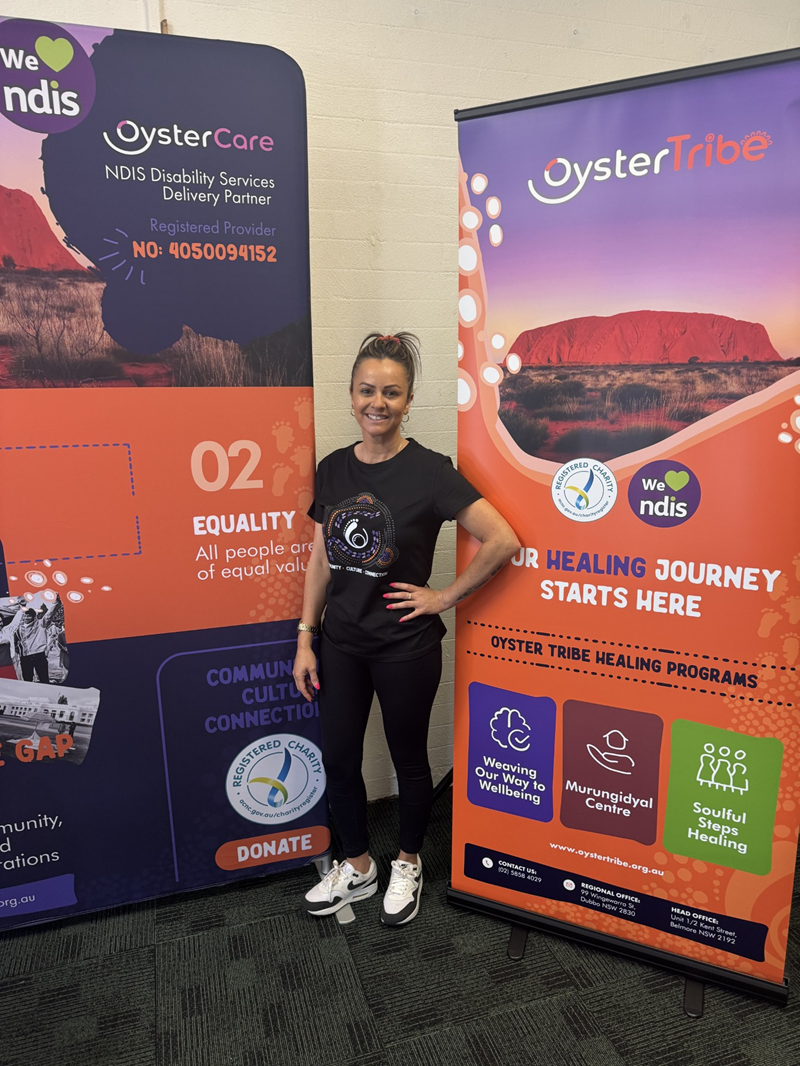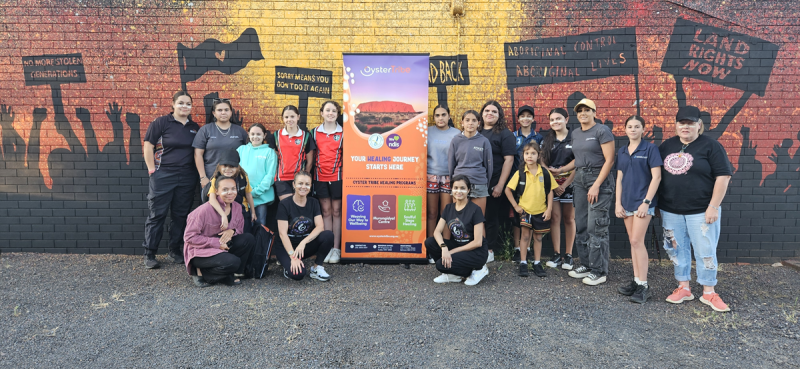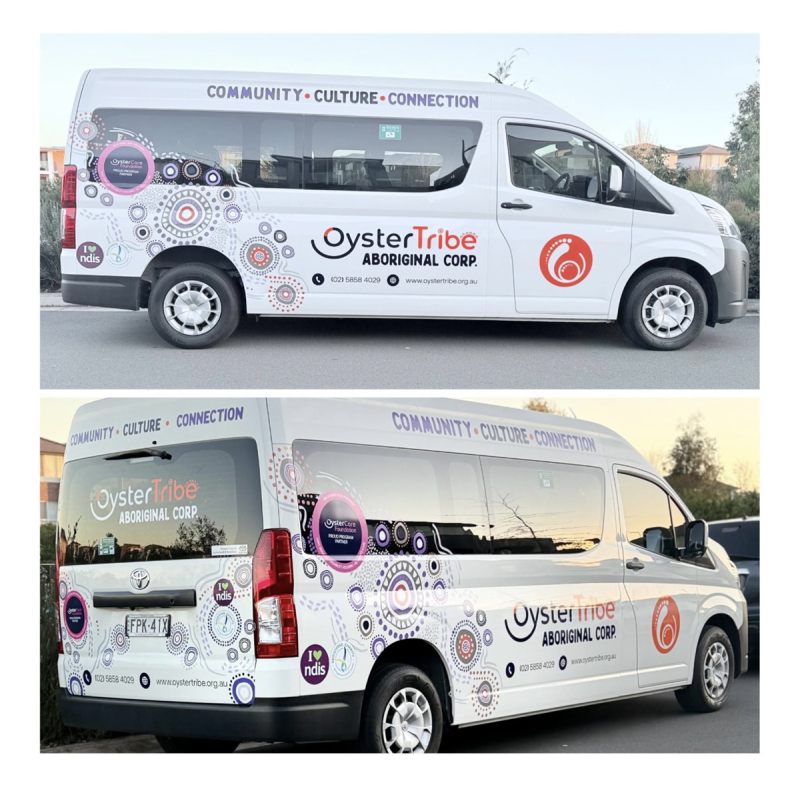Success begins with a clear purpose
When Sheena Olsen incorporated Oyster Tribe Aboriginal Corporation under the CATSI Act less than 2 years ago, she had already spent a decade building ideas and consulting community in NSW.
A partnership with Oyster Hub Advisory Partners proved crucial. Oyster Hub’s expertise in organisational growth, strategic planning and governance helped to establish everything from community consultation frameworks to ORIC registration documents and funding access strategies.
Starting is the hardest part
As a sole parent to identical twin girls – now 19 years old – Sheena had spent years juggling family life with a career in child protection, youth services, and Aboriginal business consulting.

‘I’d been helping other Aboriginal organisations become successful for years – setting up their governance, delivering programs, and giving advice,’ Sheena says.
‘One day I thought, maybe I need to step back and go, hey, let’s do this for our community. I already know what’s happening and what we need.
‘When it came to our youth, child protection and out-of-home care, there was nothing that our Aboriginal community-controlled organisations were delivering. All the programs were coming from non-Aboriginal organisations.’
Having identified the opportunity, all Sheena needed to do was start. She knew it had to come with a clear, shared purpose. So Sheena began consulting with community, gathering a small group of trusted people, and seeking professional advice.
‘We weren’t just doing this for the sake of having an Aboriginal Community Controlled Organisation (ACCO) – it had to be meaningful for our community,’ Sheena says.
‘But it wasn’t easy. I found no support for Aboriginal businesses to develop an ACCO.
‘It costs money, it takes a lot of time, and there was just nothing available. But I still wanted to do this. I don’t care how much time I need to put in – this needed to be done.’
Partnerships unlock opportunities
A conversation with Sheena’s accountant and business adviser, Adarsh Dutt of Oyster Hub Advisory Partners, led to an unexpected but pivotal partnership. While talking about her financial goals, Sheena shared her dream for an ACCO.
‘My accountant said, “You know what? You can do this.” I told him I knew I could, but I didn’t know how or what resources I needed,’ Sheena remembers.
‘It's important for ACCOs to embrace and partner with experts who can help bring your vision to life and make sure the organisation runs sustainably. You can have all the passion and community knowledge in the world, but you need people who understand the systems and structures that will make it work long-term.’
Adarsh's expertise proved crucial in four key areas:
- community consultation planning.
- establishing governing documents for ORIC and Australian Charities and Not-for-profits Commission registration.
- strategic planning and vision alignment.
- accessing government funding through proper governance structures.
That partnership also led to Sheena's introduction to Oyster Care Foundation – an NDIS provider. Together, they decided the best way forward was to incorporate under the CATSI Act, formally establishing the ACCO structure that Oyster Tribe needed.
Oyster Care supported Sheena’s vision to get off the ground and even inspired the name, which Sheena explains is ‘about looking inside someone rather than just at the outside – finding the pearl within us’.
‘Oyster Care Foundation provided all that in-kind support we couldn’t afford: websites, marketing, governance, HR, admin. They said, “Let’s get your passion out and running.”’
It was also important to Sheena that the corporation supported rather than competed with other ACCOs. ‘I didn’t want to take opportunities away from others,’ she says. ‘I’m here to collaborate, to work with community, and make sure we’re not repeating programs or in competition. We all have the same goals, so we need to work together.’
That approach led to partnerships with local youth services in her area. ‘We’re developing shared ideas so we can deliver as a collective. It’s not about running the show on our own – it’s about working together for community.’

Begin small and build
Once set up and incorporated, Oyster Tribe faced another challenge: getting funding in a space where larger non-government organisations were already established. ‘As a new ACCO without an evidence base, we were getting knocked back for grants. We had great ideas and models, but no delivery history,’ Sheena says.
‘The governance structures established with Oyster Hub meant we could track outcomes properly and demonstrate accountability to funders.’
Sheena notes the solution was to start small.
‘Rather than applying for big grants, we went for smaller ones – $5,000 or $10,000 – and invested our own time and resources to deliver programs. That gave us the evidence to show we could run successful programs and get outcomes for our community.’
Persistence paid off. In the past 5 months, Oyster Tribe has secured 6 grants and, in July and August, launched a 5-year youth night patrol program funded by Youth Justice.
‘We’ve got a full-time coordinator, administration assistant and 6 youth patrol officers working Thursday, Friday and Saturday nights to get our kids off the streets,’ Sheena says.

The program is caring for young people, supporting a safer community, all while providing local jobs for Aboriginal and Torres Strait Islander people. It’s the first of its kind for NSW and has the potential to set an example for other state government-funded, community run programs.
Family foundations
Sheena’s motivation comes from her upbringing in Bourke. The values instilled by her family drive her to give others a safe place to grow. ‘We may not have had money and there were plenty of us living in a 2-bedroom house. But we had love and family. That foundation shaped me,’ Sheena says.
She dreams of seeing young people with the same foundation, and plans for Oyster Tribe to provide programs that support this vision. ‘If my girls didn’t have the opportunities and support I gave them, I don’t know where they’d be,’ she says. ‘I want to show other kids what’s possible and redirect that connection away from police or juvenile justice, and towards positive programs – doing it our way.’
Sheena sees her work as a continuation of her Elders’ efforts. ‘My aunties and uncles were big advocates for land rights and legal aid. I feel like I didn’t choose this journey – it chose me. This is what the old fellas set out for me to do.’
Learning lessons and sharing success
Thinking about what she’s learned along the way, Sheena’s more than happy to share advice and inspiration, and plans to make this part of her services to other organisations.
'You can't do this alone – find advisers who understand both business governance and cultural significance. The right partnership turns vision into sustainable reality. Question the “why” and make sure it’s for community benefit,’ she says.
This includes having the right people at the table in the corporation.
‘We need a skilled board – not just a board – with business and financial expertise to keep us accountable and focused. Good governance is important. Have your strategic plan, goals and purpose set. Keep reviewing them so you can adapt to changing community needs.’
Even though it started small, the investment of hours and money is starting to pay off for Oyster Tribe. It may not seem like it at the start, but Sheena says to hang in there.
‘Even small programs can prove you can deliver and open doors to bigger opportunities,’ she says. ‘There will be times you want to give up. Keep going. If you’ve got the passion, don’t stop because you get knocked back.’
It’s still early for Oyster Tribe, but the momentum is building. Its focus is on youth and child protection, but there are plans to expand into other areas over time.
Sheena’s longer-term goal is to help other communities start their own corporations. ‘Because I’ve been there and faced the challenges, I want to empower others to develop their own ACCO. I know how hard it is, but I also know it can be done.’
For Sheena, the measure of success is in community outcomes. ‘I see the difference it’s making in people’s lives, and to know that I’m doing something good for the community from our little organisation – that’s amazing.’